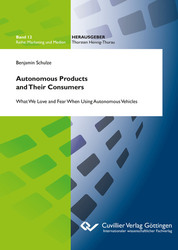| Fachbereiche | |
|---|---|
| Buchreihen (97) |
1381
|
| Nachhaltigkeit |
3
|
| Gesundheitswesen |
1
|
| Geisteswissenschaften |
2370
|
| Medienwissenschaften | 16 |
| Theologie | 57 |
| Philosophie | 102 |
| Rechtswissenschaft | 423 |
| Wirtschaftswissenschaften | 852 |
| Sozialwissenschaften | 417 |
| Sportwissenschaften | 48 |
| Psychologie | 233 |
| Pädagogik | 190 |
| Geschichtswissenschaften | 183 |
| Kunstwissenschaften | 111 |
| Kulturwissenschaften | 166 |
| Literaturwissenschaften | 117 |
| Sprachwissenschaften | 88 |
| Naturwissenschaften |
5407
|
| Ingenieurwissenschaften |
1798
|
| Allgemein |
98
|
|
Leitlinien Unfallchirurgie
5. Auflage bestellen |
|
Erweiterte Suche
Autonomous Products and Their Consumers: What We Love and Fear When Using Autonomous Vehicles (Band 12)
Benjamin Schulze (Autor)Vorschau
Inhaltsverzeichnis, PDF (590 KB)
Leseprobe, PDF (620 KB)
Hundreds of millions of people all around the world have driven cars for over a century. Soon, technological progress will allow us to substitute the manually driven car with the autonomous vehicle. As the autonomous vehicle is considered to have the potential to disrupt the mobility industry, it is of high relevance for researchers and practitioners to examine this radical innovation from a consumer perspective. So far, we do not have a comprehensive understanding about the benefits that drive consumers’ intention to use an autonomous vehicle in the future and the sacrifices that act as psychological barriers. Therefore, the goal of this thesis is to explore these benefits and sacrifices and investigate their importance for consumers’ decision to use autonomous vehicles.
For this thesis, a theoretical framework was developed by integrating the decomposed theory of reasoned action with an enhanced version of means-end theory. The framework led to the qualitative examination of benefits and sacrifices that consumers believe exist when using an autonomous vehicle. The relative importance of each benefit and sacrifice for the decision to use an autonomous vehicle in the future was then investigated with a quantitative study. In addition, four consumer segments that differ in their decision drivers and barriers were discovered with a latent class regression.
The results of this thesis include several meaningful implications for practitioners and future research. These implications have the potential to guide managerial decision-making in the mobility and related industries and create an opportunity to directly influence the future of mobility by taking action to make the autonomous vehicle succeed in the market.
| ISBN-13 (Printausgabe) | 9783736971790 |
| ISBN-13 (E-Book) | 9783736961791 |
| Buchendformat | A5 |
| Sprache | Englisch |
| Seitenanzahl | 244 |
| Umschlagkaschierung | matt |
| Auflage | 1. |
| Buchreihe | Marketing und Medien |
| Band | 12 |
| Erscheinungsort | Göttingen |
| Promotionsort | Münster |
| Erscheinungsdatum | 07.03.2020 |
| Allgemeine Einordnung | Dissertation |
| Fachbereiche |
Wirtschaftswissenschaften
|
| Schlagwörter | autonomy, autonomous vehicle, autonomous driving, autonomous products, radical innovations, consumer perspective, psychological adoption drivers and barriers, autonomy benefits, autonomy sacrifices, autonomy utility, usage intention, personal values, algorithms, artificial intelligence, consumer segments, enhanced means-end theory, theory of reasoned action, laddering interviews, regression analysis, latent class regression, conjoint analysis, impact-performance matrix, Autonomie, autonomes Fahrzeug, Autonomes Fahren, autonome Produkte, radikale Neuerungen, Verbraucher-Perspektive, psychologische Adoptionstreiber und Barrieren, Vorteile der Autonomie, Autonomie-Opfer, Autonomie-Nutzen, Nutzungsabsicht, persönliche Werte, Algorithmen, Künstliche Intelligenz, Verbrauchersegmente, erweiterte Theorie der Mittelwertbildung, Theorie des durchdachten Handelns, Leiter-Interviews, Regressionsanalyse, latente Klassenregression, Conjoint-Analyse, Wirkungs-Performance-Matrix |








